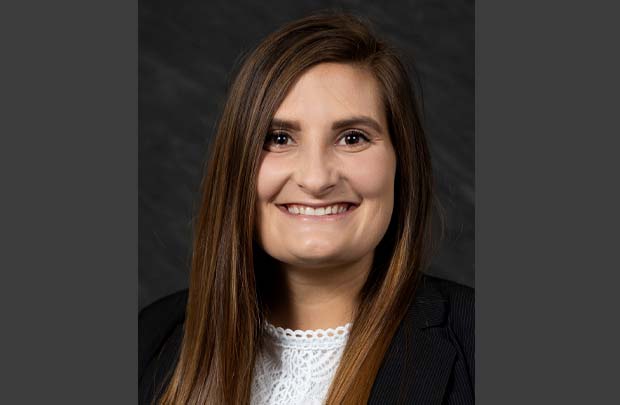
Whitney Coots is an Indian Child Welfare Act case manager at the Citizen Potawatomi Nation in Oklahoma. She works on permanency cases in tribal court and in several state courts and investigates reports of child abuse and neglect.
A colleague of Whitney’s suggested that we feature her as an Outstanding Caseworker, writing:
“Whitney has a very busy personal life raising her four children, and even when she finds herself working late, she keeps a positive attitude and always helps families in their time of need. I am really proud of the growth I have seen in Whitney and watched her thrive in her role helping Potawatomi children stay safe and families stay together.”
How did it feel to be recognized by a colleague in this way?
It was exciting to feel appreciated and know that people actually do recognize my work. This is not the kind of job where you get a lot of thanks.
How long have you been doing this work? What attracted you to it?
I started in September 2019, so just two years. But I feel like I’ve been doing it a lot longer—in a good way!
I always wanted to work with children, and I studied criminal justice in college with the intention of doing forensic interviewing with children. My first job out of college was working in probation, on cases that often involved abuse or neglect of children. That experience made me want to work in child welfare.
Around that time, I learned about disproportionality—the fact that a higher percentage of Native American children are brought into foster care than their white peers. I decided that I wanted to be a voice for Native kids and help families get the support they need to stay together. Now I cannot imagine doing anything else.
It sounds like you wear many hats—from investigating allegations of abuse and neglect all the way to permanency?
It’s true. Our department is a one-stop shop. There are usually two case managers, and each of us follows a case the entire time, so a child has the same worker from the moment of referral through investigation to closure. We really get to know our families and children, and that makes it easier to get them the help they need. It’s rewarding to be able to support people in this way and—ultimately—see kids get permanency in their life and families come together.
Is that often the outcome—that families are reunified?
Often, but not always. If reunification is not possible, then we work to place the child with a relative or a tribally approved foster home. We do everything we can to keep the child’s culture and the heritage part of their life.
You are a member of the Chocktaw Nation. Has doing this work strengthened your tribal connections?
Very much. I wasn’t connected to culture growing up. It wasn’t something that my family engaged in, and we didn’t live nearby the tribal community.
Working for tribe has brought more of the Potawatomi culture into my family’s life and shown me the benefits of being connected to the tribe. I did not expect that to happen when I took this job. My kids go to Potawatomi day care. They’re learning about the culture and the language—and they are sharing what they learn with me! It’s awesome to see them absorbing knowledge about their culture that they will always have. I know it will benefit them in the long run.
One of the things that impressed your colleague is that you manage to balance work and family life. What is your secret?
I try to leave work at work. This is a really emotional job, and it can be mentally and emotionally draining. When they day is over, I go home and focus on my four children. It has taken me a while to get to this place, and sometimes it’s impossible. But my kids are little, and once I’m home, my mindset has to be on them. There’s just no time to dwell on what happened at work that day.